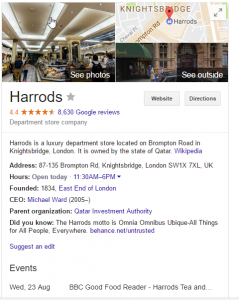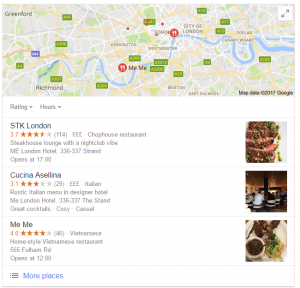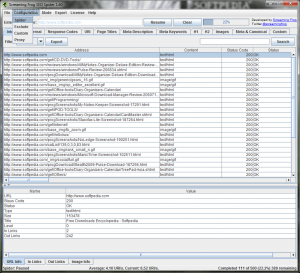Are you just starting a business? Or is your business struggling to keep up amidst the booming online economy? Maybe it’s time to look into some search engine optimization (SEO) techniques that will help boost your site rankings. And don’t worry about the cost of a professional SEO agency just yet-these are SEO tips you can implement yourself!
Out of these 10 tips, you will see these three main themes: organization, recognition, and dynamic approaches. SEO requires a different approach for every company in every industry, but these themes can help you find the right path to a successful SEO strategy for your organization.
Schema 
Schema are at the core of any website. They not only provide an organizational system from the website without having to change all the URLs or even the linking patterns, but they also can increase the click-through rate (CTR) of the website. There are many different types of schema (for example, breadcrumbs, organization schema, event schema, product schema, or rating schema), and not all of them are needed on every site. However, when schemas are used correctly, a website can gain a much higher CTR right from the search engine results page (SERP).
Hierarchy
This is all about the internal structure of your website. Similar to certain schema and also to sitemaps, your content needs to be organized in a way that makes sense and is easy to navigate. As with anything, start with the broadest topics on the main pages, and work down to specific topics from there. Create categories and even subcategories (if necessary), but don’t overload your site with content. Have a broad purpose for your site, but a narrow focus, so that your users don’t get overwhelmed and find themselves confused on how to use your site.
 Keyword Targeting
Keyword Targeting
When you start doing keyword research for your website, you’ll likely see some words with rankings already in the top 10. For the first step in improving your keyword targeting, look for relevant terms that have lower search values. It makes no sense to compete on words that are already ranked highly, but if you can strengthen the position of words that have lower rankings, it will help your website in the long run. You can do this through adding internal or external links, or incorporating the keywords in new content that is being added to each site.
Understanding the Client
Your target audience isn’t “the Internet” or “all online users”. Understanding your client is about finding your niche. This means identifying your product, the people who are most likely to use said product, and how to reach that audience. Look for other sites where that audience is active, and where they participate on social media. By figuring out these elements, you can start developing a more focused online marketing campaign.
Google Local
Google Local, while important for brick and mortar businesses, is just as important for online businesses. This is a step similar to creating an organization schema, but it gives you the presence you need on Google for people to locate your business, rate their experience, and get the basic details. Besides building local citations and mentioning your business’s location in your meta tags, showing up in other local guides improves your presence on Google Local. Plus, with people’s reliance on Google’s search results, if you pop up in their local results, you have a better chance of increasing your CTR as opposed to a standard organic search result.
Mobile-Friendly
Now that most businesses have apps, and mobile commerce has skyrocketed in recent years, your website must not only be desktop-friendly but also mobile-friendly. This means making sure your content is just as easy to read on a smartphone, and also making sure points of conversion in an app or on a mobile device (downloads, email sign-ups, points of sale), are just as easy to use and access as they would be on a desktop.
Meta Tags
Meta tags are essentially the first phrases your user or client sees on the search engine results on your webpage itself. These are your page title, page description, main heading (H1), and sub-headings (H2). These organize your content, but they are also summarizing everything your reader. When the reader sees the meta tags on the SERP, they should automatically know the type of the content that they will see on that page. Once they click on that link, the H1 should be a broad summary of what they are about to read, and each H2 should be a short heading about every few paragraphs. These tags help organize the page and focus the reader, because the quicker the user finds what they are looking for, the better.
Fix Bad URLs with Screaming Frog 
Screaming Frog is an essential tool for anyone concentrating on improving the SEO of their website. One of the biggest downfalls of a website is to have bad URLs. These can be pages that don’t exist anymore, pages where content cannot be loaded, pages where code is incomplete, and a variety of other situations. If Screaming Frog finds a lot of these ‘bad’ pages on your website, it does not bode well for your SEO ranking or your user experience. Those two things go hand in hand, so it is essential that every page on your website is purposeful, has the correct designations, and is coded properly.
Sitemaps
Sitemaps are one of the most useful tools you can build for search engines because they provide a map for your entire site. If a sitemap is not built correctly, it can have the same effect on your SEO as bad URLs do. There are two types of sitemaps: HTML, which can be read by both users and search engines, and XML, which is written only for search engines. Both of them allow search engines to “crawl” through your site and find pages that are relevant to the user’s search. If your site is not well-organized, your page is not likely to show up high in search results, nor is it likely to be deemed useful by the search engines.
Don’t neglect your site (Always be updating.) 
This is probably the most crucial, on-going step for maintaining a strong SEO on your website. Once you build a strong website, and strengthen the initial SEO, that is great. But SEO is not a one-time cure-all for your website. If you leave the content on your website as it is, and never update the content, add anything new, or review a technical analysis, your website will fall in the search engine rankings because the content will be seen as less and less relevant. The best way to correct this is to keep finding new and interesting approaches related to the subject of your website. The more regularly you update your website and the more you make sure that your SEO standards always remain at the highest level, the more likely it is that your website will be successful in the long run.
Still Not Sure if All Your Bases Are Covered?
If you follow all these steps and your SEO rankings still haven’t improved, it might be time to look into working with a company that offers professional SEO services. An SEO agency is made up of a team of experts whose job it is to find the gaps in your strategy. The best thing to do is try and make progress on your own first, as there is a wealth of resources out there for people who want to work on their SEO solo, but always know there are people out there ready to offer their services so that your business can succeed!
